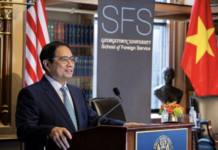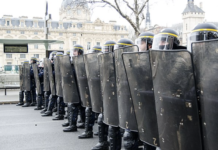![]()
One of the few things Georgetown students on both sides of the aisle can agree on is that something needs to be done about the influence of technology companies. Mark Zuckerberg stated in 2019 at Georgetown that he believed Facebook could be “an important part of voice, especially for local candidates and up-and-coming challengers and advocacy groups that the media might not otherwise cover.” He has a sense of humor because earlier this year Facebook banned groups opposing the recent coup in Myanmar.
His words have done little since to assuage concerns about tech censorship. A recent Pew Research survey showed that 68% of adults believe major tech companies have too much power, with only a 10-point difference between Democrats and Republicans. It’s easy to hold the companies themselves responsible for this but, as always, Congress is to blame. Regulations left over from the 1990s were inadequate two years ago, to say nothing of the increased importance social media has taken on since the start of the pandemic.
The universal usage of these companies’ products combined with the lack of government regulation has given them a unique ability to shape public discord, and a lack of First Amendment protections on social media is a major part of the problem. Critics of this position may claim that as private companies they should have the right to do as they please. This does not take into account that, at this point, they function as the public squares of today. Consider the fact that when Facebook and Instagram went down for a few hours several weeks ago, many businesses had their commerce disrupted. Garnering support through social media is the new version of picketing in front of the White House, and harassing passerbys is no longer enough to spread the word in order to effectively promote a cause. It is essential to have access to social media. The way tech companies wielded this power may seem benign enough, mostly limited to removing conspiracy theories, but failing to act now leaves the people vulnerable to the real problem: government censorship by proxy.
Imagine a scenario where protests against a new law are being organized and promoted online. The government would like to stop this, so it pressures social media companies. They start removing posts under threat of being audited, or an investigation being opened against them. Rather than facing increased scrutiny, they choose to comply. While the First Amendment has technically been preserved, the intent of the Constitution has been successfully violated. This may seem far-fetched, but American tech companies have already done this upon request in Russia, Turkey, Brazil, Vietnam, and Thailand. They have even done it in well-developed democracies like India and South Korea. The danger is clear. An update to American laws is needed, or we risk losing the spirit of the law while preserving the letter.











